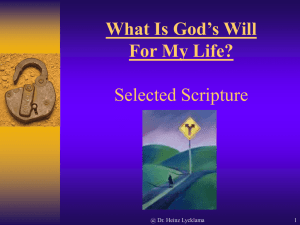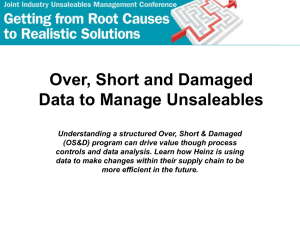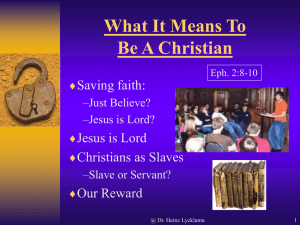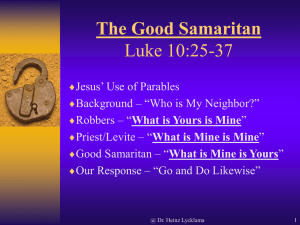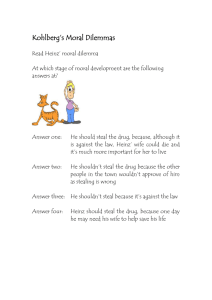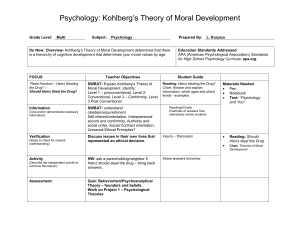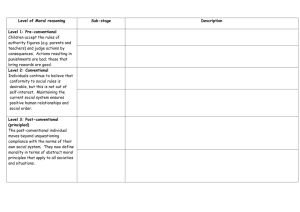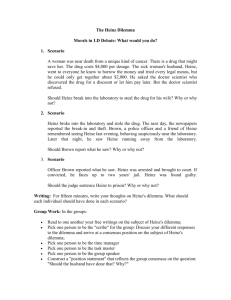RationalFaith
advertisement
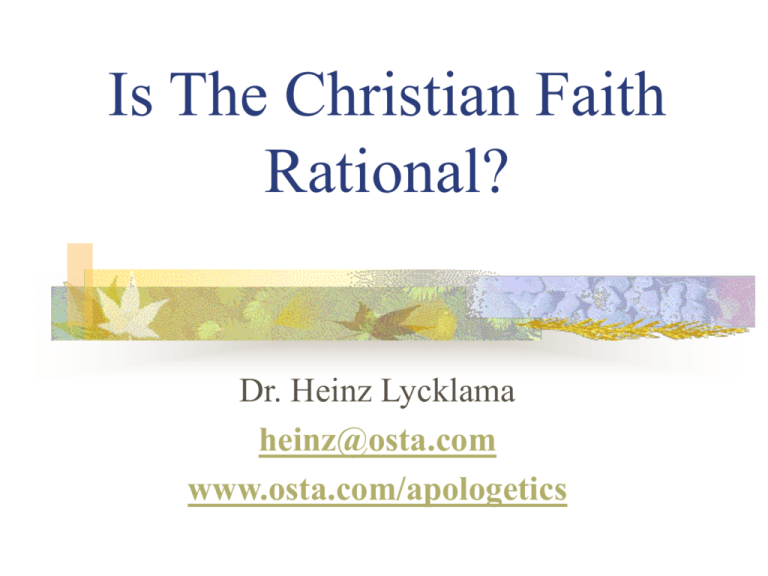
Is The Christian Faith Rational? Dr. Heinz Lycklama heinz@osta.com www.osta.com/apologetics Christianity – A Rational Faith The Testimony of Eye Witnesses Dispelling Misconceptions What is Faith? A Rational Body of Truth Creation Makes It Plain More Arguments For God’s Existence Addressing Postmodernism Addressing Skepticism Addressing Agnosticism @ Dr. Heinz Lycklama 2 Topics/Questions Covered 1. 2. 3. 4. 5. 6. 7. 8. 9. Does Your Truth Match Reality? Jesus’ Credibility – Is He God? Prophecies Come True – Messianic + Others Christ Rose From the Grave – What is the Evidence? Is the Bible God’s Word? Does Archaeology Verify the Bible? Creation Apologetics Is the Bible Reliable Scientifically? (If God is All-Loving and All-Knowing), Why Is There So Much Pain and Suffering? @ Dr. Heinz Lycklama 3 Why Christian Apologetics? 1 Pet. 3:15, “But sanctify the Lord God in your hearts, and always be ready to give a defense to everyone who asks you a reason for the hope that is in you, with meekness and fear;” Matt. 22:37, “You shall love the LORD your God with all your heart, with all your soul, and with all your mind.” 1 Th. 5:21-22, “Test all things; hold fast what is good. Abstain from every form of evil.” 2 Cor. 10:5, “casting down arguments and every high thing that exalts itself against the knowledge of God, bringing every thought into captivity to the obedience of Christ,” @ Dr. Heinz Lycklama 4 The Testimony of Eye Witnesses @ Dr. Heinz Lycklama 5 NT Eyewitnesses NT writers were (or recorded) eyewitnesses of the events they described John 20:30-31, “And truly Jesus did many other signs in the presence of His disciples, which are not written in this book; but these are written that you may believe that Jesus is the Christ, the Son of God, and that believing you may have life in His name.” 2 Pet. 1:16, “For we did not follow cunningly devised fables when we made known to you the power and coming of our Lord Jesus Christ, but were eyewitnesses of His majesty.” @ Dr. Heinz Lycklama 6 The Gospel According to Luke Luke recorded eyewitness accounts: Luke 1:1-4, “Inasmuch as many have taken in hand to set in order a narrative of those things which have been fulfilled among us, just as those who from the beginning were eyewitnesses and ministers of the word delivered them to us, it seemed good to me also, having had perfect understanding of all things from the very first, to write to you an orderly account, most excellent Theophilus, that you may know the certainty of those things in which you were instructed.” @ Dr. Heinz Lycklama 7 The Acts of The Apostles Luke recorded eyewitness accounts: Acts 1:1-3, “The former account I made, O Theophilus, of all that Jesus began both to do and teach, until the day in which He was taken up, after He through the Holy Spirit had given commandments to the apostles whom He had chosen, to whom He also presented Himself alive after His suffering by many infallible proofs, being seen by them during forty days and speaking of the things pertaining to the kingdom of God.” @ Dr. Heinz Lycklama 8 The Acts of The Apostles – 2 Some of the eyewitnesses: Acts 1:9, “Now when He had spoken these things, while they watched, He was taken up, and a cloud received Him out of their sight.” Acts 2:22, “Men of Israel, hear these words: Jesus of Nazareth, a Man attested by God to you by miracles, wonders, and signs which God did through Him in your midst, as you yourselves also know” Acts 10:39-42, “And we are witnesses of all things which He did both in the land of the Jews and in Jerusalem, whom they killed by hanging on a tree. Him God raised up on the third day, and showed Him openly, …” @ Dr. Heinz Lycklama 9 Dispelling Misconceptions @ Dr. Heinz Lycklama 10 Misconceptions Dispelled Blind faith – committing intellectual suicide Just be sincere – as long as you believe it enough The Bible is full of myths – eyewitnesses? The Jesus of history is unknowable Loving Christians should accept other religious views – tolerance vs. truth I have an intellectual problem – ignorance, pride, or moral issues @ Dr. Heinz Lycklama 11 I Have an Intellectual Problem Ignorance: Pride Rom. 1:18-23, “For the wrath of God is revealed from heaven against all ungodliness and unrighteousness of men, who suppress the truth in unrighteousness, because what may be known of God is manifest in them, for God has shown it to them. … ” Matt. 22:29, “Jesus answered and said to them, ‘You are mistaken, not knowing the Scriptures nor the power of God.’” John 5:40-44, “But you are not willing to come to Me that you may have life. … “ Moral issues John 3:19-20, “And this is the condemnation, that the light has come into the world, and men loved darkness rather than light, because their deeds were evil. … “ @ Dr. Heinz Lycklama 12 Competing Worldviews Atheism – belief that there is no God Agnosticism – man cannot attain knowledge of God Postmodernism – all meaning and truth is relative Skepticism – reliable or absolute knowledge is impossible Eastern mysticism – direct knowledge of God or ultimate reality is attainable through immediate intuition @ Dr. Heinz Lycklama 13 What Is Faith? @ Dr. Heinz Lycklama 14 What Is Faith? Heb. 11:1-3, “Now faith is the substance of things hoped for, the evidence of things not seen. For by it the elders obtained a good testimony. By faith we understand that the worlds were framed by the word of God, so that the things which are seen were not made of things which are visible.” @ Dr. Heinz Lycklama 15 Paul’s Faith II Tim. 1:12-13, “For this reason I also suffer these things; nevertheless I am not ashamed, for I know whom I have believed and am persuaded that He is able to keep what I have committed to Him until that Day. Hold fast the pattern of sound words which you have heard from me, in faith and love which are in Christ Jesus.” @ Dr. Heinz Lycklama 16 The Believer’s Faith What do we believe? Why do we believe what we believe? Is. 1:18, “’Come now, and let us reason together,’ says the LORD, … ” What are the truths that support our belief? What truths do we live by? Is Christianity rational and can it withstand scrutiny? “Faith in Christianity is based on evidence.” Paul Little @ Dr. Heinz Lycklama 17 The Christian Faith The Christian faith is an intelligent faith It never consists of a mindless act which is unrelated to reality Is it real? Does my “truth” match reality? We are encouraged to use our minds when investigating Christianity Matt. 22:37, “Jesus said to him, ‘You shall love the Lord your God with all your heart, and with all your soul, and with all your mind.’” Don’t leave your brains at the door @ Dr. Heinz Lycklama 18 We All Live By Faith We have faith in the doctor, the grocery store, the person who asks us for a date We have faith in the food we eat in a restaurant We have faith in the scientific method Relationships are built on some degree of faith in the other person @ Dr. Heinz Lycklama 19 The Object Of Our Faith For example, ride in a wheelbarrow across a tight rope over Niagara Falls Our faith is only as valid as the object in which it is placed Whatever the object of our faith, we should check its reliability, investigate and learn the truth @ Dr. Heinz Lycklama 20 Test All Things 1 Cor. 10:15, “I speak as to wise men; judge for yourselves what I say.” 1 Th. 5:21, “Test all things; hold fast what is good.” 1 John 4:1, “Beloved, do not believe every spirit, but test the spirits, whether they are of God; because many false prophets have gone out into the world.” @ Dr. Heinz Lycklama 21 A Rational Body of Truth @ Dr. Heinz Lycklama 22 Rationality of the Christian Faith What is our prior thinking about Christianity? What do we know about Christianity: Ignorant of the facts? Have a misunderstanding? What is our view of Christianity based on examples of “practicing Christians?” What is our cultural background? @ Dr. Heinz Lycklama 23 Religious Pluralism Religious pluralism and postmodern thinking lead people to think: All religions are equally valid Contradictions between religious systems are fully acceptable Absolute truth does not exist @ Dr. Heinz Lycklama 24 Can Christianity Be Tested Objectively? “Religious assertions incapable of being tested objectively are meaningless” Anthony Flew, British scientist who came to believe in theism at age 84 Christianity has the empirical evidence of the incarnation and resurrection of Jesus Christ John 20:14, “Now when she had said this, she turned around and saw Jesus standing there, and did not know that it was Jesus.” @ Dr. Heinz Lycklama 25 Searching The Scriptures Acts 17:11, “These were more fair-minded than those in Thessalonica, in that they received the word with all readiness, and searched the Scriptures daily to find out whether these things were so.” The Bereans The Christian faith is open to verification/testing The non-Christian is encouraged to use his mind to check out the claims of Christ @ Dr. Heinz Lycklama 26 Testing The Scriptures There are many non-believers who have tried to disprove the Christian faith and have ended up becoming Christians: Josh McDowell wrote the book “Evidence That Demands a Verdict” + others Frank Morrison (a lawyer) wrote the book “Who Rolled Away The Stone?” Lee Strobel (a journalist) wrote the book “The Case for Christ” + others @ Dr. Heinz Lycklama 27 A Rational Body of Truth The Bible stresses the importance of revealed rational processes Jesus stressed this to His disciples – Matt. 22:37, “Love the Lord your God with all your heart, and with all your soul, and with all your mind.” Involves the whole person – mind, emotion, will The Apostle Paul described himself as “defending and confirming the gospel” in Phil. 1:7, i.e. giving an apologetic for his faith This implies a clearly understandable message that can be rationally understood and supported @ Dr. Heinz Lycklama 28 A Rational Body of Truth – 2 Enlightenment brings satisfying comprehension when based on a rational body of truth 1 Pet. 3:15, “ … always be ready to give a defense to everyone who asks you a reason for the hope that is in you, … ” The Christian faith is always equated with truth Truth is the opposite of error. 2 Th. 2:11, “And for this reason God will send them strong delusion, that they should believe the lie, … “ The key question is “does absolute truth exist?” @ Dr. Heinz Lycklama 29 Christianity Is Rational Acts 1:3, “To whom He also presented Himself alive after His suffering by many infallible proofs, being seen by them during forty days and speaking of the things pertaining to the kingdom of God.” Skeptics ask the same questions again and again Genuine seeking will be rewarded You can believe it, for Christianity is rational John 10:10, “I have come that they may have life, and that they may have it more abundantly.” @ Dr. Heinz Lycklama 30 Creation Makes It Plain @ Dr. Heinz Lycklama 31 Creation Makes It Plain Creation gives all people enough knowledge to know there is a God Rom. 1:19-20, “because what may be known of God is manifest in them, for God has shown it to them. For since the creation of the world His invisible attributes are clearly seen, being understood by the things that are made, even His eternal power and Godhead, so that they are without excuse,” @ Dr. Heinz Lycklama 32 God’s Omniscience & Omnipotence God has complete knowledge of all of the mysteries of biology, physiology, zoology, chemistry, psychology, geology, physics, etc. We see God’s eternal power and divine nature in His creation @ Dr. Heinz Lycklama 33 Seeing The Big Picture We “explore” to see how we fit into the “big picture” from God’s perspective Where did we come from? Why are we here? What happens when we die? Stephen Hawking in “A Brief History of Time” states “now if we only knew the why, we would have the mind of God.” God gives us answers in His Book @ Dr. Heinz Lycklama 34 Moral Smoke Screens In some cases, the true issue is not that people cannot believe – it is that they will not believe It is a moral issue, not an intellectual issue If morality is “feeling derived,” who makes the rules? If Christianity is only “feeling derived,” it leads to absurdity The Pharisees were unwilling to believe John 5:40, “But you are not willing to come to Me that you may have life.” @ Dr. Heinz Lycklama 35 Moral Smoke Screens – 2 Moral commitment brings understanding to the mind John 7:17, "If anyone wills to do His will, he shall know concerning the doctrine, whether it is from God or whether I speak on My own authority.” Both educated and uneducated people don’t want to believe it Belief is ultimately a matter of the will A student may have received all of the answers to his questions, but will not become a Christian because “it would mess up the way I’m living.” @ Dr. Heinz Lycklama 36 Doubt Strikes Terror John Stott – “We cannot pander to a man’s intellectual arrogance, but we must cater to his intellectual integrity.” In our early years we accept the facts of Christianity solely on the basis of confidence and trust in parents, friends and pastors Later we re-examine how much of this teaching we own ourselves @ Dr. Heinz Lycklama 37 Doubt Strikes Terror – 2 I know the Gospel is true because The objective, external, historical facts of the Resurrection The subjective, internal, personal experience of Jesus Christ that I have known in my own life Doubt and questioning are normal Christianity centers on the One who is Truth Scrutiny is no threat @ Dr. Heinz Lycklama 38 Don’t Hit The Panic Button We don’t need an immediate answer; research can provide the answer The Lord has not fully revealed His mind to us on every conceivable question Deut. 29:29, “The secret things belong to the Lord our God, but the things revealed belong to us and to our children forever.” God gives us enough information to have a solid foundation under our faith Christianity is based on reasonable faith @ Dr. Heinz Lycklama 39 More Arguments For God’s Existence @ Dr. Heinz Lycklama 40 Arguments For God’s Existence “Eternity in their hearts” The Law of Cause and Effect Infinite Time Plus Chance? Order and Design in the Universe The Universe Had a Beginning The Moral Argument God Has Penetrated the Finite Changed Lives @ Dr. Heinz Lycklama 41 Is There A God? This question challenges every thinking person More consequences for thought and action follow the affirmation or denial of God than from answering any other basic question Is God a force to be defied or a Lord to be obeyed? @ Dr. Heinz Lycklama 42 God In A Test Tube? We can’t prove God by the scientific method We can’t prove that Napoleon lived by the scientific method No one can rerun history Just because events can’t be proved by repetition does not mean they did not occur @ Dr. Heinz Lycklama 43 “Eternity In Their Hearts” There has been a universal belief in God among the farthest and most remote primitive people of the world The original concept was of one God, who is the Creator The oldest traditions everywhere acknowledged one supreme God (monotheism) Eccl. 3:11 refers to God as having “ … put eternity in their hearts, … ” Pascal – “the God-shaped vacuum” in every person Augustine – “Our hearts are restless until they rest in Thee.” @ Dr. Heinz Lycklama 44 The Law of Cause and Effect No effect can be produced without a cause We come eventually to an uncaused cause, who is God Bertrand Russell asked the question – “Well, who created God?” Without an answer “My entire faith collapsed.” God (Creator and Beginner) is eternal by definition e.g. painting, note on door, human beings, universe Uncreated, self-existent Being eternal, God is not an effect; He is uncaused @ Dr. Heinz Lycklama 45 Time + Chance? Computer cannot come into being without an intelligent designer A monkey in a print shop cannot set Lincoln’s “Gettysburg Address” Could the universe in its incredible complexity have happened by chance? Einstein recognized God as the designer of the human body, but never came to a belief in a personal God as far as we know Universe/human race – by chance or by purpose and design? @ Dr. Heinz Lycklama 46 Probability A blind person solving a Rubik’s Cube making one move per second would take 1.35 trillion years – impossible! Forming a chain of 200 amino acids in a protein, the building block of life, would be impossible! The probability of a tornado blowing through a junkyard forming a 747 is impossible! Life cannot have arisen by chance @ Dr. Heinz Lycklama 47 Order and Design in the Universe TV – “Natural selection” or self-assembly? The universe appears to be intentionally designed Living structures are made of subnuclear particles – raises questions: How did these particles arise? Why does an electron have exactly the electrical charge and mass that it does? Why does light travel at precisely the speed that it does? Who or what dialed the value of the gravitational “constant?” @ Dr. Heinz Lycklama 48 Order and Design? Without water, and its specific properties, life would not be possible Paley, the English theologian, pointed to the eye as evidence of an all-wise Creator Darwin, in The Origin of Species, “To suppose that the eye, with so many parts all working together could have formed by natural selection, seems, I freely confess, absurd in the highest degree.” Design points to a Designer! @ Dr. Heinz Lycklama 49 The Universe Had a Beginning Gen. 1:1, “In the beginning, God created the heavens and the earth.” Ps. 102:25, “Of old You [Lord] laid the foundation of the earth, and the heavens are the work of your hands.” Secular scientists avoid the idea that the Universe had a beginning – implies a Creator Expansion of the Universe supports a beginning @ Dr. Heinz Lycklama 50 Secular Theories Continuous creation/steady-state model proposed by Hoyle et. al. in 1948 Oscillatory model proposed in 1922 – expanding and contracting universe, repeating indefinitely Abandoned in the 60’s based on discovery of cosmic microwave background radiation (CMBR) No longer supported by cosmologists Big Bang theory proposed in the early 1900’s: Incompatible with the Bible Has serious scientific problems @ Dr. Heinz Lycklama 51 His Creation Gives Evidence of Him Ps. 19:1, “The heavens declare the glory of God; the skies proclaim the work of His hands.” Rom. 1:19-20, “God has made it plain. … For since the creation of the world God’s invisible qualities – His eternal power and divine nature – have been clearly seen, being understood from what has been made, so that men are without excuse.” @ Dr. Heinz Lycklama 52 The Moral Argument Right and wrong as a clue to the meaning of the universe An appeal to some law or rule of fair play or morality Built-in consensus about what is moral decency A moral law implies that there is a moral law giver There is somebody behind the universe @ Dr. Heinz Lycklama 53 God – A Celestial Killjoy? We cannot know what God is like from nature Job 11:7, “Can you search out the deep things of God? Can you find out the limits of the Almighty?” Einstein thought of God as an impersonal force or mind @ Dr. Heinz Lycklama 54 What is God Really Like? To the Theist, God is the Creator and Ruler, and is personally involved in His creation while revealing Himself To the Deist, God created the world and yet never intrudes on it To the Agnostic, the finite cannot penetrate the infinite – the bird cannot fly out into space God, the infinite, can penetrate the finite (communicating to man what He is really like) @ Dr. Heinz Lycklama 55 God Has Penetrated the Finite Heb. 1:1-2, “God, who at various times and in various ways spoke in time past to the fathers by the prophets, has in these last days spoken to us by His Son, whom He has appointed heir of all things, through whom also He made the worlds;” God’s fullest revelation has been His entry into human history in the person of Jesus Christ The best and clearest answer to how we know there is a God is that He has visited us @ Dr. Heinz Lycklama 56 The Incarnation of Christ God is confirmed by the birth, life, death and resurrection of Jesus Christ John 1:14, “And the Word became flesh and dwelt among us, and we beheld His glory, … ” John 1:18, “No one has seen God at any time. The only begotten Son, who is in the bosom of the Father, He has declared Him.” Jesus came to earth to reveal who God is and what He is all about @ Dr. Heinz Lycklama 57 Through The Valley of the Kwai The story in “Through The Valley of the Kwai”, prisoners reduced to almost animals The prisoners started to read the NT Gordon, a skeptic leads the reading Many were unbelievers Prisoners transformed into a community of love Demonstrates the reality of God in Jesus Christ @ Dr. Heinz Lycklama 58 Changed Lives Evidence for the reality of God’s existence His clear presence in the lives of men and women today Convincing evidence from Creation, History, contemporary life – there is a God and that this God can be known in one’s personal experience @ Dr. Heinz Lycklama 59 Addressing Postmodernism @ Dr. Heinz Lycklama 60 Addressing Postmodernism Tenets of Postmodernism Truth does not correspond to reality There is no grand story (universal truth) that can account for all reality We never encounter the thing-in-itself There is no ultimate foundation upon which knowledge is based Objectivity is an illusion Truth depends on one’s perspective Ethical Theism -> Modernism -> Postmodernism Postmodernism has replaced knowledge with interpretation @ Dr. Heinz Lycklama 61 Views on “Truth” Ethical Theism – truth has been revealed to men and women by God Modernism – truth can be discovered by reason and logical augmentation Postmodernism – truth does not exist objectively; it is a product of a person’s culture The New Evidence That Demands a Verdict, Josh McDowell @ Dr. Heinz Lycklama 62 Views on “Human Identity” Ethical Theism – humans are both spiritual and material beings, created in God’s image but fallen because of sin Modernism – humans are rational, not spiritual, beings who can define their existence according to what their senses perceive Postmodernism – humans are primarily social beings, products of their culture and environment @ Dr. Heinz Lycklama 63 Views on “The World” Ethical Theism – God is the Creator, Preserver, and Governor of His earth and has instructed humans to subdue it and care for it Modernism – humans can and should conquer the earth and all its mysteries Postmodernism – life on earth is fragile, and the “Enlightenment model of the human conquest of nature … must quickly give way to a new attitude of cooperation with the earth” @ Dr. Heinz Lycklama 64 Views on “Thought & Language” Ethical Theism – reason “can disclose truth about reality, but faith and revelation are needed in addition” Modernism – for answers and understanding about life and the world around us, people should rely only on rational discovery through the scientific method and reject belief in the supernatural Postmodernism – thinking is a “social construct,” language is arbitrary, and there is no universal truth transcending culture @ Dr. Heinz Lycklama 65 Views on “Human Progress” Ethical Theism – human history is not progressing but awaiting deliverance Modernism – human progress through the use of science and reason is inevitable Postmodernism – things are not getting better; besides, progress is an oppressive Western concept @ Dr. Heinz Lycklama 66 Answering Postmodernism Postmodernism is self-defeating We can know the thing-in-itself The Postmodern rejection of representational correspondence fails to demonstrate that truth does not correspond to reality Practical experience indicates we are able to extract the author’s meaning as it exists formally in the text Truth is objective rather than dependent on one’s perspective @ Dr. Heinz Lycklama 67 Addressing Skepticism @ Dr. Heinz Lycklama 68 Addressing Skepticism David Hume’s Skepticism Questioned the knowledge claims of all disciplines – mathematics, science, and metaphysics Allowed for beliefs based on probability, which transcended our experience Against any presuppositions about 1711 - 1776 the uniformity of nature Induction is not a valid form of reason, but rather a habit of expecting similar results based on a uniformity of experience Skepticism – the belief that any reliable or absolute knowledge is impossible, and any aspects of the supernatural are unattainable by any individual. @ Dr. Heinz Lycklama 69 Tenets of Skepticism All knowledge is derived through either the senses or reflection on ideas Probable conclusions inducible from sense impressions Knowledge founded in the necessary conclusions deducible from self-evident truths Causality cannot be observed but only believed based on custom Cannot know for sure if any particular cause and effect are connected Can’t know the truth about a cause from an effect @ Dr. Heinz Lycklama 70 Answering Skepticism Skepticism is self-defeating The statement “all knowledge is derived through senses or reflection on ideas” is derived from neither of these Reduces our mind to purely sensitive faculty Radical empirical atomism (no events connected) is self-defeating and implies unity and connection Should we be skeptical of skepticism (doubts)? A unified self is assumed while denying a unity Denial of causality is self-defeating The denial requires causal connections What is known about reality cannot be known? @ Dr. Heinz Lycklama 71 Addressing Agnosticism @ Dr. Heinz Lycklama 72 Addressing Agnosticism Immanuel Kant’s Agnosticism The content of knowledge is structured by the mind There is an unbridgeable gulf between our knowledge and reality A capsule of Kant’s Agnosticism 1724 - 1804 Immanuel Kant denies that we can know what reality is in itself If we can’t know reality, we can’t know truth Agnosticism – the belief that man “either does not know or cannot know. … In theology the theory is that man cannot attain knowledge of God.” @ Dr. Heinz Lycklama 73 Kant’s Epistemology Knowledge is composed of content and form The content of knowledge is supplied by sensory experience The form/structure of knowledge is supplied by the mind There are two sources of knowledge – sense and understanding Kant declares that reason alone is not sufficient to know reality The content of knowledge is structured by the mind @ Dr. Heinz Lycklama 74 An Unbridgeable Gulf Between Our Knowledge and Reality Kant’s epistemology draws a limit to our knowledge, and reality is outside that limit We can’t find truth because we can’t know reality The mind is not satisfied with knowing the limits (beyond which we cannot know truth) Kant does not deny reality but brackets it as unknowable He believed there was a distinction between the real world and the apparent world of appearance @ Dr. Heinz Lycklama 75 Answering Agnosticism Agnosticism is self-defeating Claims that all knowledge about reality (i.e. truth) is impossible Agnosticism is offered as a truth about reality Kant claims to have knowledge of what he declares to be unknowable Categories of the mind correspond with reality Otherwise Agnosticism is unstateable Unless the real world were intelligible no statement about it would apply @ Dr. Heinz Lycklama 76 Answering Agnosticism – 2 It is not possible to affirm existence without declaring something of essence Kant’s epistemology cannot reach reality because it does not start with reality i.e. what it is in itself The knowledge depends on the realities known The certainty of Kant’s a priori conclusions are refuted by scientific realities The only way we judge whether something corresponds to reality is according to these a priori categories and not based on our experience of reality itself @ Dr. Heinz Lycklama 77 Christianity – A Rational Faith Truth is revealed by God We can know truth/reality through: Special Revelation through His Word General Revelation through His Creation God’s Revelation – His Word and Creation Our five senses Our power to reason We have been given sufficient evidence Our Faith is based on Facts (not feeling) @ Dr. Heinz Lycklama 78 Thank You! II Tim. 2:2, “And the things that you have heard from me among many witnesses, commit these to faithful men who will be able to teach others also.” @ Dr. Heinz Lycklama 79
